I recently returned from a five week stint as a farm hand. Located just outside of Dauphin, Manitoba, it’s one of those towns where everybody knows everybody. It’s also a farming community. The main purpose of my visit was to work on my uncle’s farm and maybe to learn about farming, which just so happens to be what my family has been doing for generations.
It was a pretty productive 5 weeks. My primary responsibilities included fixing equipment (in the industry, we call it “servicing”), driving tractors and grain trucks, spending lots of time by myself while the GPS and auto-steer drove the tractors, listening to country music, and trying not to kill myself with the ammonia. I succeeded in all of my tasks 😀 By the end of the month, however, I had also killed a chicken, driven a combine, hit two hay bales, burned a hay field and got screamed at by one of the neighbours, knocked over three fence posts (busted one), snapped a hitch on an ammonia rig, broke my glasses taking off an oxygen mask, and knocked over an augur.
The main “rig” I was in charge of was the cultivator, or deep-tiller, or fertilizin’ machine. This baby gave damn near broke my will to do farm work. It required much “servicing.” It was also with this machine that I learned what is considered “work.”
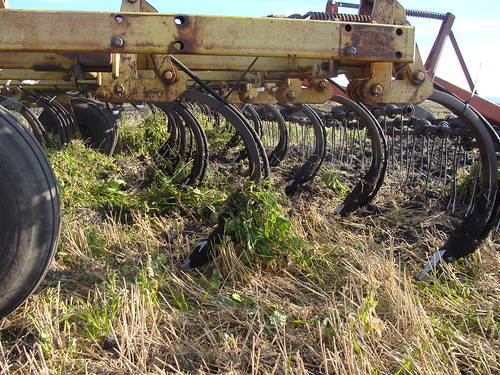
Let me explain.
“Servicing” (fixing stuff), not only requires checking the oil and filling up the tank, but requires you to check all the metal springs, shanks, and openers (the things that put the fertilizer into the ground). The openers are screwed onto the bottom tip of the shank. The openers typically didn’t give me any trouble. But those there shanks, fucking hell, did I ever develop a twitch when I heard the words, “Put on a lock washer.” Now, on a newer machine taken into a shop with two guys working with high impact drills, this would be no problem. But when you (and typically The Boss, my uncle in this case) need to crawl on the ground under the rig to check those shanks in the middle of an open field on a windy day with no power tools, those little rusted bolts become your enemy.
Now, for a bit of a digression.
For those of you who are waiting for me to answer the question, “How do farmers keep their fields so neat and their lines so straight?” Well, the farmers don’t. Unless you count buying a GPS navigation system and an auto-steer mechanism and installing it into the tractor. I’m not opposed to this idea. I’m very much for it. As a matter of fact, I kinda wonder why city buses, trains, and even cars don’t have these things attached to them. Those two items, GPS and auto-steer, are marvellous inventions.
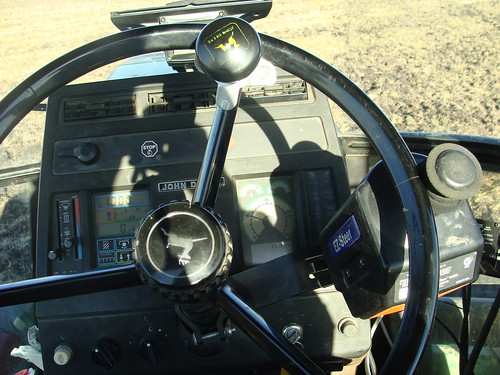
But, to get to use them, guess what you have to do?
Check the shanks.
We figured the rig was roughly the same age as me, about 28, possibly less. We also figured that some of the nuts and bolts holding the shanks to the main frame were about that old, which means that they have never been replaced and are now rusted on. How can you tell when a nut is rusted on? Well, in addition to its rusty brown colour, it might be a little loose but you can’t tighten it or loosen it very easily. The fear being that if the shank is loose, the bolt will snap and you will lose the shank. Which, trying to find a rusty brown shank in a hay field is like… well, trying to find a rusty brown shank in a hay field.
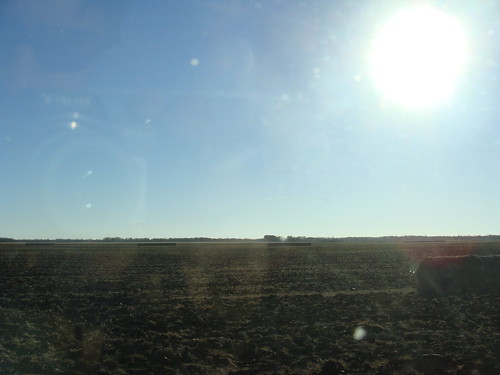
The solution, therefore, is to put something called a “lock washer” between the nut and frame and tighten it up again. So began my wonderful experience of developing my muscles, my uncle questioning my strength (“Sure, get the old guy to loosen it,” my response, “But, dearest uncle of mine, you’re more experienced” (re: have the necessary muscle)), and devising all sorts of four-, six-, eight- and multiple-syllabic word combinations none of which my mother, or aunt, would approve.
Only when all 40 of the shanks have been checked can you then climb into your nicely heated tractor cab, turn on the radio, let the GPS and auto-steer do their job while you enjoy your coffee and amazing lunch that your wonderfully thoughtful aunt prepared. But only if there aren’t any busted springs.
While cultivating some new skills with those shanks, I also learned a few important phrases. (The first two phrases were actually told to me by a friend who works in the film industry.) The first is “It’s my first day,” a wonderful phrase that let’s the other person know that you know that you’re a complete idiot and don’t know what you’re really doing or looking for. They forgive your dumbness, help you out, and then let you on your way. You can use this two or three times before people catch on. The next is “There’s no time. We’re losing light.” This phrase, taken from the film industry, couldn’t be more suited to farming. Though GPS and auto-steer make working a field easier, especially in the dark, it’s still better to get the work done during the daylight hours. Then you can go home and drink whiskey 😀 Third, spoken by my uncle, is “Don’t make work for Ernie.” This phrase was repeated to me many many MANY times after the Great Augur Incident.
(Okay, the augur thing… basically, I was driving the tractor and needed to fuel it up. I didn’t have enough room to make the turn where I was so, thinking I was smart and a time saver, I decided I’d take the tractor (and cultivator and ammonia rig) into the field and make the turn there. Well, things didn’t go quite as planned as the cultivator didn’t clear the augur. Nope, it ran smack into it and knocked the whole thing over. Luckily the other farm hand, Rob, was there with the skid steer to help lift the augur from the cultivator and not hit the ammonia rig. If it had hit the ammonia rig, Rob tells me, there would’ve been ambulances, firetrucks, cops, and haz-mat suits all over the place, “just in case.” Oh, did I mentioned that The Boss was in Winnipeg that day and I had to call him the next day to tell him what happened? Thank you, Rob, I owe you.)
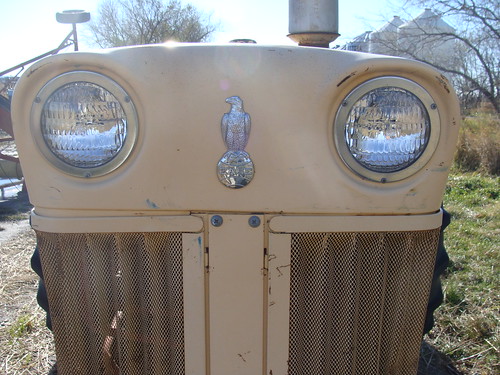
Towards the end of October, however, the weather turned for the worse. I truly got a feeling for being a farmer when the snow came, thus ending my work for the season. (Farmers, however, get to see the entire crop get washed away by torrential downpours and frost! Suddenly getting ripped off $30 at the Cambodian border or buying tea leaves for $25 doesn’t seem so bad!) If you’d like to see some more photos from my time on the farm, check out my Flickr page.
In my next post I’ll cover the few adventures I had while around Dauphin, Manitoba.
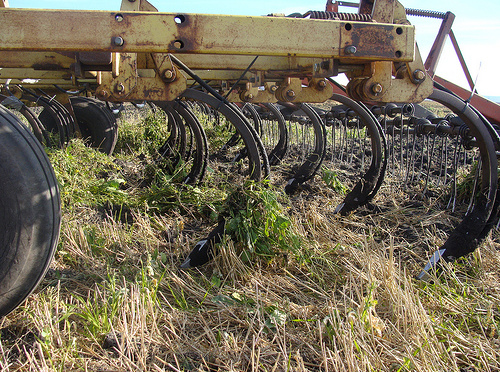
Comments
11 Responses to “My Life on the Farm”
Great website…
[…]we like to honor many other internet sites on the web, even if they aren’t linked to us, by linking to them. Under are some webpages worth checking out[…]……
Great website…
[…]we like to honor many other internet sites on the web, even if they aren’t linked to us, by linking to them. Under are some webpages worth checking out[…]……
Visitor recommendations…
[…]one of our visitors recently recommended the following website[…]……
Visitor recommendations…
[…]one of our visitors recently recommended the following website[…]……
[…] and there are a variety of online brokers to choose from. A month teaching English in Korea or go work on a farm for a few weeks and you will be able to open an account. By opening an account you are ready to participate in […]
[…] and there are a variety of online brokers to choose from. A month teaching English in Korea or go work on a farm for a few weeks and you will be able to open an account. By opening an account you are ready to participate in […]
[…] I’m back in Canada now, I’ve become a seasonal worker on a farm. I’ve worked on my uncle’s farm before but not during harvest, a time when “days off” don’t really exist. Right off the bus I […]
[…] I’m back in Canada now, I’ve become a seasonal worker on a farm. I’ve worked on my uncle’s farm before but not during harvest, a time when “days off” don’t really exist. Right off the bus I […]
Enjoyed your blog and look forward to reading more! I came across it via Google Alerts. Do you mind if I share this on the Tourism Dauphin Facebook page? (I know your aunts and cousin, Rachel.) Thanks!
Carla
Enjoyed your blog and look forward to reading more! I came across it via Google Alerts. Do you mind if I share this on the Tourism Dauphin Facebook page? (I know your aunts and cousin, Rachel.) Thanks!
Carla
Hey Carla! Glad you enjoyed the read. And yes, please share it on the tourism site 😀